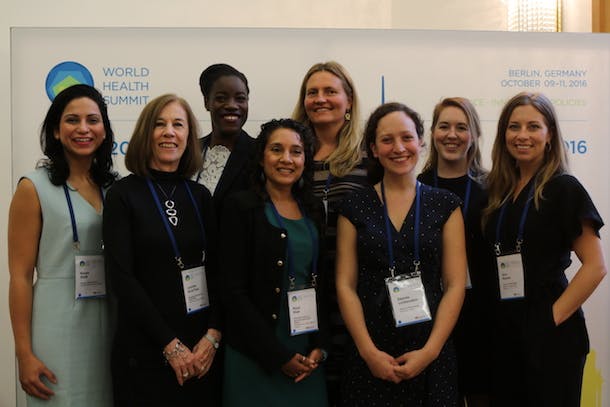
Earlier this year at the World Health Assembly, I had the honor to interview a few of the inspiring women leading the Women Leaders in Global Health Initiative (WLGHI), a group working to increase the representation of women in all leadership levels in the global health arena. Gender equality and women’s empowerment are critical in helping us to achieve the Sustainable Development Goals and a necessary foundation for a peaceful, prosperous, and sustainable world. To learn more, check out my conversation with Roopa Dhatt, Director of the Women Leaders in Global Health Initiative. You can also watch clips from my interview with the WLGHI team: Women in Global Health Initiative, Women in Global Health, How to Support Gender Equity
Q: What should people know about the Women Leaders in Global Health Initiative?
A: The Women Leaders in Global Health Initiative (WLGHI) is an initiative of Women in Global Health (WGH) and the Global Health Council (GHC). WLGHI was conceived in spring of 2015, and our vision is a world where women are represented in equal numbers to men at the highest levels of global health decision-making and visibility.
Our mission to is address the individual, institutional, and political challenges that impede a woman’s positioning as a leader in global health through focusing on the areas of Raising Awareness, Networking & Mentorship, and Capacity Building to create social change. We work with partners at all levels to strive for greater gender equality in health leadership.
Q: What are some of the current challenges faced regarding gender and professional development, and reasons we don’t have gender-balanced leadership already?
A: The problem of gender equity in global health leadership is complex. If women are not present at the highest levels of leadership, it is a symptom of structural discrimination within the organization, country, or institution. During their careers, women have different demands and pressures on them than men and in part due to social norms, women tend to perceive themselves, their work, and their authority very differently than their male counterparts, often impeding their climb up the “career ladder.”
Q: Why is elevating women and achieving gender-balanced leadership so important to both developing leaders and to the global health sector in general?
A: The most fundamental reason is that women are half the world’s population and should be represented equitably at all levels. Women and men bring distinct skills to the table; both genders have different competencies and strengths yet are equally qualified to lead. Appreciating the differences in how men and women express leadership is important to understand if we are to have resilient health systems.
Women have different concerns than men, making this balance extremely important in regards to global development. Many of the Sustainable Development Goals SDGs being tackled address gender (for example, Sustainable Development Goal 5 focuses entirely on gender equality) and making sure both genders are present in decision-making is essential to ensure sustainable solutions. Ensuring gender equal leadership can strengthen democracy and development efforts, contributing to stronger and more sustainable progress.
Q: How are WLGHI and WGH working to resolve this?
A:We as an initiative want to get to the root of the problem and change structures that contribute to gender inequity. We aim to create equal terms, not special benefits, for all genders. To do this, we need to change the culture and the attitudes of the workplace, to value women in leadership positions, and to make policies that make it possible for women to reach, and more importantly stay in such positions. Just getting women to the top tier is not sufficient – society needs to listen to women in power in the same way they listen to men in power.
We work with various other partners and supporters to encourage stakeholders from governments, civil society, foundations, academia, professional associations, and the private sector to achieve gender equality in global health leadership. We coordinate with these groups to support the incorporation of gender equity into their existing programs and activities, while also fostering a culture of gender responsive leadership so they can be agents of change within their own organizations.
We actively co-author papers and have co-hosted high-visibility events like those at the World Health Summit, the World Health Assembly, and the Graduate Institute in Geneva. We create tools for advocacy at all levels and seek to develop greater capacity in all leaders. Increased knowledge and understanding of gender equity can catalyze greater gender equity in leadership in communities and professions around the globe. WGH hosts trainings and workshops on the issues we tackle and we support a network for women, men, and others to elevate each other by creating opportunities for collaboration, leadership development, and mentorship.
Q: How can I be involved?
A: There are many ways to champion gender equality in global health and beyond. You can join the movement and actively participate in elevating women leaders, regardless of your gender: Learn more about gender equality; put on your “gender glasses” when discussing issues; and you can even speak to your supervisors if you notice a gender pay gap or unfair promotional practices at your workplace. Make a point not to reinforce gender stereotypes in your personal and professional life, take paternity leave if you are a father or advocate for it if your organization doesn’t have it, and stand up against sexism at work/school/home.
Be aware that every one of us has a gender bias to some degree so make sure you are conscious of your bias and try to work past it. You can find materials, tools, news and updates on workshops and trainings on the Women in Global Health website, like our checklist you can use at global health conferences.



 View All Blog Posts
View All Blog Posts